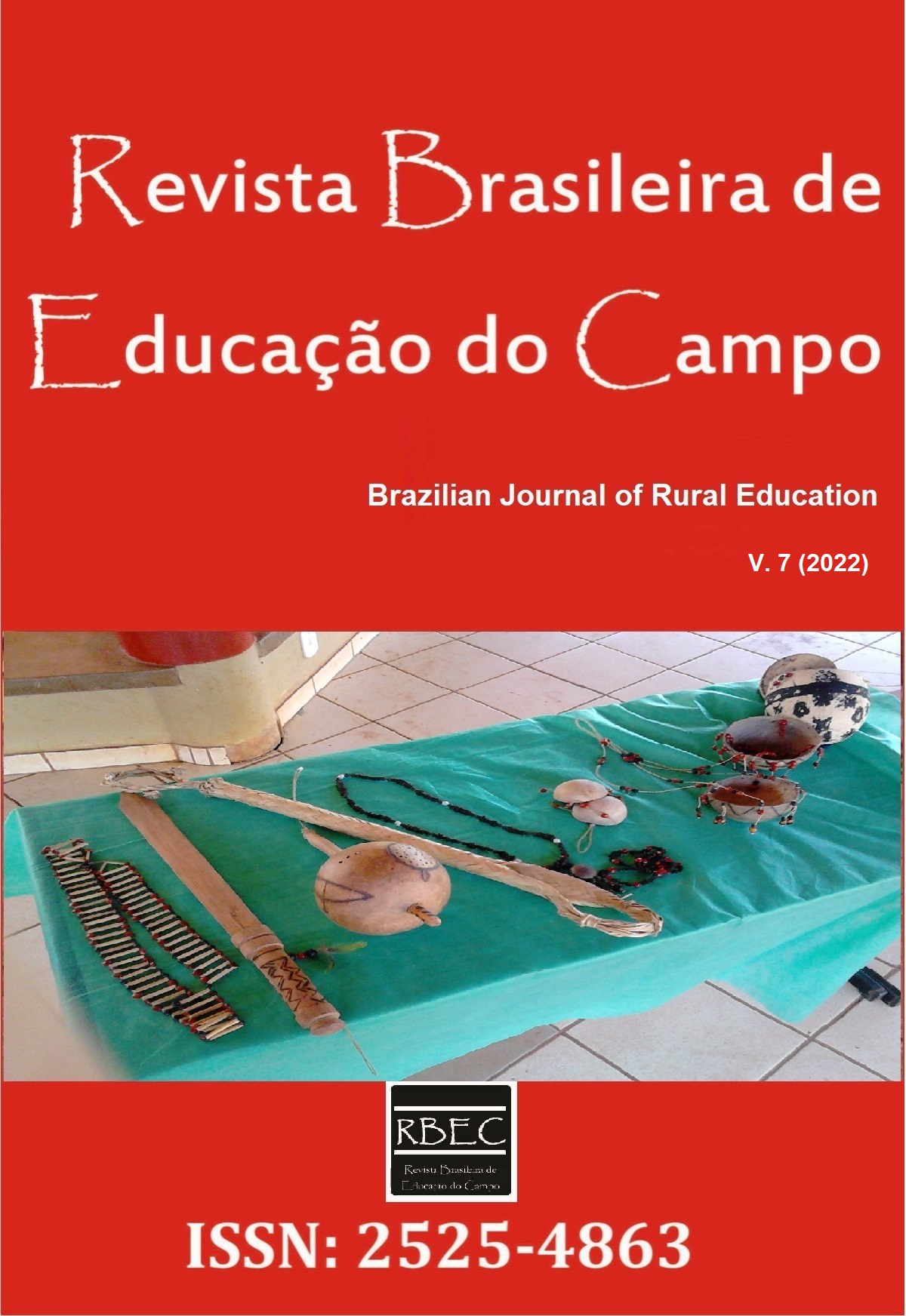The Escola da Terra Program and teacher formation at UFRRJ
DOI:
https://doi.org/10.20873/uft.rbec.e13827Abstract
ABSTRACT. The main objective of this article is to present some reflections on the challenges of teacher education in the Escola da Terra Program, considering the pedagogical experiences developed at UFRRJ - Federal Rural University of Rio de Janeiro, in the interface with public policies for rural education. We developed a bibliographical and documentary research, using among the research sources, legislation, ordinances and decrees, as well as theoretical references on rural education and the Escola da Terra Program. We conclude that the collective production of knowledge, in partnership with course participants, teaching staff, tutors, communities and social movements fighting for land, contributed to the appreciation of the stories, memories, desires and identity recognition of the individuals, individual and collective, of the field, in its close relationship with rural schools. We found that this articulation is one of the main challenges to be faced by the rural education movement in Brazil.
Downloads
Literaturhinweise
Bicalho, R. (2017). História da educação do campo no Brasil: o protagonismo dos movimentos sociais. Teias, 18(51), 210-224. https://doi.org/10.12957/teias.2017.24758
Bicalho, R. (2018a). Interfaces da educação do campo e movimentos sociais: possibilidades de formação. Revista Pedagógica, 20(1), 81-100. https://doi.org/10.22196/rp.v20i43.3882
Bicalho, R. (2018b). Reflexões sobre o PROCAMPO – Programa de Apoio à Formação Superior em Licenciatura em Educação do Campo. ECCOS – Revista Científica, 45(1), 221-236. https://doi.org/10.5585/eccos.n45.7783
Bicalho, R., & Abbonizio, A. C. O. (2016). A pedagogia da alternância e a Licenciatura em Educação do Campo na UFRRJ – Universidade Federal Rural do Rio de Janeiro: o ensino médio e a formação de educadores do campo. Dialogia, 23(1), 69-79. https://doi.org/10.5585/dialogia.N23.6244
Bicalho, R., & Silva, M. A. (2016). Políticas públicas em educação do campo: PRONERA, PROCAMPO e PRONACAMPO. Revista Eletrônica de Educação, 2(10), 135-144. https://doi.org/10.14244/198271991549
Caldart, R. S. (Org.). (2010). Caminhos para transformação da escola: reflexões desde práticas da Licenciatura em Educação do Campo. São Paulo: Expressão Popular.
Nota Técnica sobre o Programa Escola Ativa: uma análise crítica. (2011). Fórum Nacional de Educação do Campo. Brasil, FONEC.
Instituto Nacional de Estudos e Pesquisas Educacionais Anísio Teixeira – INEP (2019). Censo Escolar da Educação Básica 2019. Notas Estatísticas. Brasília: Ministério da Educação. Recuperado de http://portal.inep.gov.br/informacao-da-publicacao/-/asset_publisher/6JYIsGMAMkW1/document/id/6798882
Molina, M. C. (2006). Educação do Campo e Pesquisa: questões para reflexão. Brasília: Ministério do Desenvolvimento Agrário.
Pereira, E. A. (2003). Formação de jovens e participação social: um estudo sobre a formação de três jovens da Escola Família Agrícola de Porto Nacional (Dissertação de Mestrado). Universidade Nova de Lisboa/Université de Tours, Lisboa/Tours.
Praxedes, W. L., & Rossato, G. (2016). Fundamentos da educação do campo: História, legislação, identidades camponesas e pedagogia. São Paulo: Edições Loyola.
Programa Escola Ativa – Projeto Base. (2010). Secretaria de Educação Continuada, Alfabetização e Diversidade. Brasília: Ministério da Educação.
Stedile, J. P. (2020). Conceitos e tipos de reforma agrafia. In Stedile, J. P. (Org.). Experiências históricas de reforma agrária no mundo (pp. 15-28). São Paulo: Expressão Popular.
Universidade Federal Rural do Rio de Janeiro – UFRRJ. (2019). Projeto de Curso Escola da Terra. 1ª Edição. Oferta 2018-2019. Rio de Janeiro.
Universidade Federal Rural do Rio de Janeiro – UFRRJ. (2021). Projeto de Curso Escola da Terra. 2ª Edição. Oferta 2020-2021. Rio de Janeiro.
Veröffentlicht
Zitationsvorschlag
Ausgabe
Rubrik
Lizenz
Creative Commons Attribution License
Creative Commons Attribution License
Proposal for Copyright Notice Creative Commons
1. Policy Proposal to Open Access Journals
Authors who publish with this journal agree to the following terms:
A. Authors retain copyright and grant the journal right of first publication with the work simultaneously licensed under the Creative Commons Attribution License that allows sharing the work with recognition of its initial publication in this journal.
B. Authors are able to take on additional contracts separately, non-exclusive distribution of the version of the paper published in this journal (ex .: publish in institutional repository or as a book), with an acknowledgment of its initial publication in this journal.
C. Authors are permitted and encouraged to post their work online (eg .: in institutional repositories or on their website) at any point before or during the editorial process, as it can lead to productive exchanges, as well as increase the impact and the citation of published work (See the Effect of Open Access).














